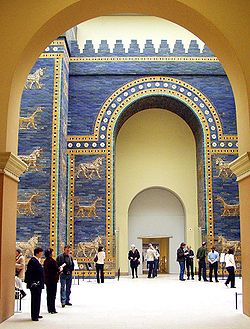Pergamon Museum

The Pergamon Museum (German: Pergamonmuseum) is situated on the Museum Island in Berlin. The site was designed by Alfred Messel and Ludwig Hoffmann and was constructed in twenty years, from 1910 to 1930. The Pergamon houses original-sized, reconstructed monumental buildings such as the Pergamon Altar, the Market Gate of Miletus, all consisting of parts transported from Turkey. There is controversy over the legitimacy of the acquisition of the collection. It was suggested that the collection should be returned to Turkey (original country of the excavations).
The museum is subdivided into the antiquity collection, the Middle East museum, and the museum of Islamic art. The museum is visited by approximately 850,000 people every year, making it the most visited art museum in Germany (2006).
Contents |
Origin


By the time the Kaiser-Friedrich-Museum on Museum Island (today the Bodemuseum) had opened, it was clear that the museum was not large enough to host all of the art and archaeological treasures excavated under German supervision. Excavations were underway in Babylon, Uruk, Assur, Miletus, Priene and Egypt, and objects from these sites could not be properly displayed within the existing German museum system. As early as 1907, Wilhelm von Bode, the director of the Kaiser-Friedrich-Wilhelm-Museum had plans to build a new museum nearby to accommodate ancient architecture, German post-antiquity art, and Middle Eastern and Islamic art.
This large three-wing museum had been in planning since 1907; when Alfred Messel died in 1909 his close friend Ludwig Hoffman took charge of construction, which began in 1910. The construction continued during the First World War (1918) and the great inflation of the 1920s. In 1930 the building hosting the four museums opened.
The Pergamon Museum was severely damaged during the air attack on Berlin at the end of the Second World War. Many of the display objects were stored in safe places, and some of the large pieces were walled in for protection. In 1945, the Red Army collected all of the loose museum items, either as war booty or, ostensibly, to rescue them from looting and fires then raging in Berlin. Not until 1958 were most of the objects returned to East Germany. Significant parts of the collection remain in Russia. Some are currently stored in the Pushkin Museum in Moscow and the Hermitage in Saint Petersburg. The return of these items has been arranged in a treaty between Germany and Russia but, as of June 2003, is blocked by Russian restitution laws.
Exhibition
Among the pieces the museum displays are:
- The Pergamon Altar
- Market Gate of Miletus
- The Ishtar Gate and the Processional Way, Babylon
- The Mshatta facade
Antiquity Collection (Antikensammlung)
The collection goes back to the Electors, or Kurfürsten, of Brandenburg, who collected objects from antiquity; the collection began with an acquisition to the collection by a Roman archaeologist in 1698. It first became accessible (in part) to the public in 1830, when the Altes Museum was opened. The collection expanded greatly with the excavations in Olympia, Samos, Pergamon, Miletus, Priene, Magnesia, Cyprus and Didyma.
This collection is divided between the Pergamon Museum and the Altes Museum.
The collection contains sculpture from archaic to Hellenistic ages as well as artwork from Greek and Roman antiquity: architecture, sculptures, inscriptions, mosaics, bronzes, jewelry and pottery
The main exhibits are the Pergamon Altar from the 2nd century BC, with a 113 meters (371 ft) long sculptural frieze depicting the struggle of the gods and the giants, and the Gate of Miletus from Roman antiquity.
As Germany was divided following the Second World War, so was the collection. The Pergamon Museum was reopened in 1959 in East Berlin, while what remained in West Berlin is on display in the Castle of Charlottenburg since 1995.
Islamic Art Museum (Museum für Islamische Kunst)
When the Bode-Museum was opened in 1904, a section for Islamic art was created which was later on included in the Pergamon Museum (in 1950) .
Besides Islamic artwork from the 8th to the 19th century ranging from Spain to India, the main attraction is the Mshatta facade, which originates from an unfinished early Islamic desert palace located south of Amman in present-day Jordan. It was a gift from the Ottoman Sultan Abdul Hamid II to Emperor Wilhelm II of Germany. Parts of the eastern portion of the facade and the ruins of the structure of which it formed a part remain in Jordan.
Another unique exhibition is the Aleppo room.
The Islamic Art Museum also regularly hosts temporary exhibitions of modern art from the Islamic world, in 2008 for example Turkish Delight (contemporary Turkish design) and Naqsh (Gender in Iranian art and society).
The Middle East Museum (Vorderasiatisches Museum)
The Middle East Museum exhibition displays objects, found by German archeologists and others, from the areas of Assyrian, Sumerian and Babylonian culture. Additionally there are historical buildings, reliefs and lesser cultural objects and jewelry.
The main display is the Ishtar Gate and the Procession Way of Babylon together with the throne room facade of Nebuchadrezzar II.
Future plans
The main plan for the Museum Island dictates an expansion of the Pergamon Museum, which will become the centre of the museum complex. It will connect to Neues Museum, Bodemuseum and Alte Nationalgalerie and the new entrance building.
There was an architectural competition in 2000, won by Oswald Mathias Ungers from Cologne. The museum complex will be redeveloped according to his plan, which controversially proposes large alterations to a set of buildings unchanged since 1930. The current entrance building will replace the building in Ehrenhof, and an elevated walk (Archäologische Promenade, archeologic walk) will connect the buildings. The rebuilding is scheduled to begin in 2005 and end in 2010.
External links
|
|||||||
